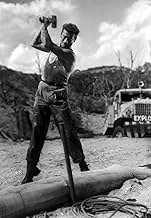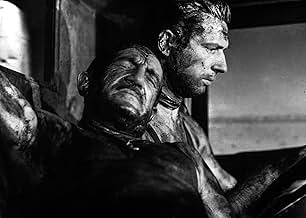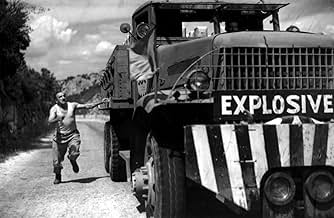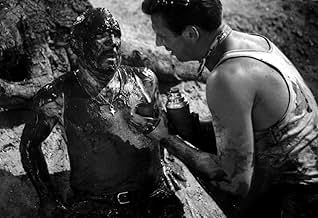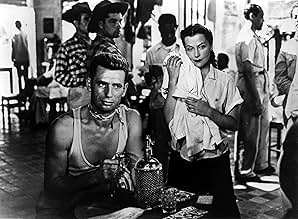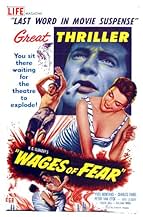एक जर्जर दक्षिण अमेरिकी गांव में, चार पुरुषों को उपकरण के बिना एक तत्काल नाइट्रोग्लिसरीन शिपमेंट के परिवहन के लिए काम पर रखा जाता है जो इसे सुरक्षित बना देगा।एक जर्जर दक्षिण अमेरिकी गांव में, चार पुरुषों को उपकरण के बिना एक तत्काल नाइट्रोग्लिसरीन शिपमेंट के परिवहन के लिए काम पर रखा जाता है जो इसे सुरक्षित बना देगा।एक जर्जर दक्षिण अमेरिकी गांव में, चार पुरुषों को उपकरण के बिना एक तत्काल नाइट्रोग्लिसरीन शिपमेंट के परिवहन के लिए काम पर रखा जाता है जो इसे सुरक्षित बना देगा।
- निर्देशक
- लेखक
- स्टार
- 1 BAFTA अवार्ड जीते गए
- 6 जीत और कुल 1 नामांकन
Peter van Eyck
- Bimba
- (as Peter Van Eyck)
Véra Clouzot
- Linda
- (as Vera Clouzot)
Darío Moreno
- Pepito Hernandez
- (as Dario Moreno)
Antonio Centa
- Camp Chief
- (as Centa)
Charles Fawcett
- Bradley
- (बिना क्रेडिट के)
सारांश
Reviewers say 'The Wages of Fear' is a gripping film about desperation and survival, with intense suspense and masterful direction by Henri-Georges Clouzot. Critics praise Yves Montand and Charles Vanel's performances and the exploration of human resilience. Some find the initial setup slow and criticize the portrayal of the American oil company. Despite this, the film is celebrated for its innovative cinematography and thematic depth.
फ़ीचर्ड समीक्षाएं
This movie is a true masterpiece in every way! When I rented the DVD and read the story it sounded familiar, because I had watched the newer version before in color with Roy Scheider, which was good as well. But watching the original film truly blew me away. This movie is well made in every detail. It puts a lot of detail-work in the creation of the characters, and once you think that is over and the "regular action-part" starts, it becomes even better and the story takes a 90 degree turn! After I had finished watching the entire movie, I needed at least 5 minutes just to "digest" it and rethink this fantastic film. If you got a chance to watch it, don't miss it! It is entertaining from the first to the last minute!
"The Wages of Fear" was awarded by unanimous verdict the Grand Prix at 1953 Cannes Film Festival where it won over 27 films, some of which were made by Jacques Tati, Alfred Hitchcock, and Luis Buñuel. Cluozot's own screenplay (based a novel by George Arnaud) focuses on four down-and-out European adventurers (Yves Montand, Folco Lulli, Peter Van Eyck, Charles Vanel) who stuck nearly penniless in a festering town in an unnamed South American country. An oil company need a load of highly dangerous and explosive nitroglycerin to be delivered to a remote well fire 300 miles away burning out of control. The route is through jungles and over crude and treacherous mountains and those men are desperate enough to take the chance. None of these men is heroic or generous, they are in for the money. The four were chosen by the managers of oil company because "if something happens to them, no one would care, they have nobody to worry about them". Henri-Georges Clouzot's view on humanity is not particularly optimistic but he finds a way to make a viewer care about disenchanted but desperate characters. Thanks to Clouzot's ability to create not only a gripping action film but a powerful study of failure, the four men will stay for long time in our memory.
In The Wages of Fear, four men in a remote South American town have the enviable task of transporting a metric buttload (technical term) of nitroglycerin across mountainous roads in poor condition. It's a taut, superbly suspenseful thriller, guided with a steady hand by director Henri-Georges Clouzot, who would go on to direct the classic Diabolique in 1955.
Yves Montand, in a rare dramatic role, plays Mario, the ostensible protagonist of our tale. He's been stuck in this backwater for some time, but it costs a lot of money to get out – plane fares are through the roof, and there's no train, and there's no neighboring village. In short, you're stuck there until you can buy a ticket – and pay for a passport, of course.
Mario spends his days looking for work, wooing tavern worker Linda, and despairing about the lack of work. There's an American oil company in town, but they're no longer hiring. His monotonous lifestyle is interrupted by the arrival of fellow expat Jo (Charles Vanel), a tough-looking older man who quickly wins Mario's favor at the expense of the rest of the men in town.
The oil company, in fact, has its own problem – one of their large derricks has exploded, causing a huge oil fire. Company man Bill O'Brien decides to send two trucks loaded with nitro from the town up the mountain to the derrick. (The eventual idea is to set off charges, which will somehow contain or extinguish the fire.) O'Brien has no trouble scaring up volunteers for the task, since the men of the town are largely unemployed. Four men will be selected to take the two trucks. Only one truck is needed; the second is truly just in case there's an accident with the first one. The men will receive $2000 when the work is finished, more than enough to secure passage out of the backwater.
Mario and Jo are chosen, as are Mario's roommate Luigi (Folco Lulli) and German expat Bimba (Peter van Eyck). The two trucks depart early in the morning, full of gas and of nitro. Danger awaits.
Theirs is not an easy task. The road is full of ruts. In one place, the wooden deck that trucks use to make a sharp turn up the mountain has been damaged from disuse. It's hot and muggy. And one has to be very, very careful, as even the smallest bump might set the whole shebang off. There's also tension among the four drivers – Luigi is unhappy that Mario is spending more time with Jo than with him, Mario is unhappy with what he perceives as Jo's cowardice. Bimba seems to get along with everyone, though.
The whole time I was watching this movie, I was certain not all four were going to make it. I will not spoil what is now a sixty-three-year-old movie, but I was still genuinely surprised by the ending. This ain't no fairy tale or sitcom. This is a movie about desperation, redemption, sacrifice, and comeuppance. It's not necessarily about justice.
The Wages of Fear is a singularly terrific movie from start to finish, exquisitely shot and expertly written. Its money maker is its tension, something present here in spades. The writing is impeccable; even personality changes make perfect sense within the film's context. There are intricacies within a straightforward plot. This is a must see for lovers of thrillers.
Yves Montand, in a rare dramatic role, plays Mario, the ostensible protagonist of our tale. He's been stuck in this backwater for some time, but it costs a lot of money to get out – plane fares are through the roof, and there's no train, and there's no neighboring village. In short, you're stuck there until you can buy a ticket – and pay for a passport, of course.
Mario spends his days looking for work, wooing tavern worker Linda, and despairing about the lack of work. There's an American oil company in town, but they're no longer hiring. His monotonous lifestyle is interrupted by the arrival of fellow expat Jo (Charles Vanel), a tough-looking older man who quickly wins Mario's favor at the expense of the rest of the men in town.
The oil company, in fact, has its own problem – one of their large derricks has exploded, causing a huge oil fire. Company man Bill O'Brien decides to send two trucks loaded with nitro from the town up the mountain to the derrick. (The eventual idea is to set off charges, which will somehow contain or extinguish the fire.) O'Brien has no trouble scaring up volunteers for the task, since the men of the town are largely unemployed. Four men will be selected to take the two trucks. Only one truck is needed; the second is truly just in case there's an accident with the first one. The men will receive $2000 when the work is finished, more than enough to secure passage out of the backwater.
Mario and Jo are chosen, as are Mario's roommate Luigi (Folco Lulli) and German expat Bimba (Peter van Eyck). The two trucks depart early in the morning, full of gas and of nitro. Danger awaits.
Theirs is not an easy task. The road is full of ruts. In one place, the wooden deck that trucks use to make a sharp turn up the mountain has been damaged from disuse. It's hot and muggy. And one has to be very, very careful, as even the smallest bump might set the whole shebang off. There's also tension among the four drivers – Luigi is unhappy that Mario is spending more time with Jo than with him, Mario is unhappy with what he perceives as Jo's cowardice. Bimba seems to get along with everyone, though.
The whole time I was watching this movie, I was certain not all four were going to make it. I will not spoil what is now a sixty-three-year-old movie, but I was still genuinely surprised by the ending. This ain't no fairy tale or sitcom. This is a movie about desperation, redemption, sacrifice, and comeuppance. It's not necessarily about justice.
The Wages of Fear is a singularly terrific movie from start to finish, exquisitely shot and expertly written. Its money maker is its tension, something present here in spades. The writing is impeccable; even personality changes make perfect sense within the film's context. There are intricacies within a straightforward plot. This is a must see for lovers of thrillers.
10barleeku
This movie is astonishing, a gritty story filmed in an ultra-real style that relies simply on the beauty of lighting and film to achieve its stunning effects. It seems from another world, which in a way, it is. The acting is superb: Montand's Mario is full of jerky movements and intense impulses but always maintains his Gallic savoir-faire, while Charles Vanel as Jo brings, at first at least, a type of macho to the screen that modern movie-makers simply do not comprehend. The rest of the cast, especially the camp chief, Luigi, and Peter van Eyck as Bimba are incredible, as is Vera Clouzot who is incomprehensibly but believably upbeat and innocent - and totally gorgeous - in the midst of the hellhole of a town they're all stuck in. Clouzot's directing is flawless - I don't think anyone has ever squeezed more tension with just a few essential scene elements. The trucks wheeze and grunt as well as they ever have in the movies - the only comparison is Spielberg's early gem, "The Duel", but Clouzot's automotive cinematics outdo even Spielberg. The stripped down existentialism of the characters, the starkness of their shared dilemma, the grim and grimy scenery, and the cinematography itself are all of a piece. The latter is what elevates this movie to the very top rank, including some of the most dramatic and effective black and white shooting I've ever seen. Yet it never becomes mannered or gratuitous - it is orchestrated with the rise - and rise! - of tension in the film. The final scene takes on a surreal as opposed to ultra-realistic quality that has its own logic. One last word about the acting - we don't see anything like it anymore. The self-conscious mannerism of method acting (which has had its own triumphs) and the toxic awareness of everyone from the actors to the audience, the camera, directors, etc. that each actor is a celebrity and potential artiste, has ruined that conviction that actors were once larger than life people before they went on-screen, that they came to acting as an outcome of living rough, unadorned, and yet imaginative lives as opposed to shooting for fame and fortune and celebrity within an artificial corporate star-making incubator.
9dtb
Georges Arnaud's novel LE SALAIRE DE LA PEUR has been filmed twice, by Henri-Georges Clouzot as THE WAGES OF FEAR (1953) and by William Friedkin as SORCERER (1977). While both films are worth seeing, the earlier version is the one regarded as a classic, and rightly so. Although SORCERER goes into more detail about the political climate and the various misdeeds that led the four desperate protagonists to the South American hellhole where they accept high-paying but life-risking jobs driving nitroglycerin through treacherous terrain, WAGES... distinguishes the men's personalities better, giving the audience more rooting interest in them. Both films have excellent casts, with charismatic leads in Yves Montand (WAGES...) and Roy Scheider (SORCERER), plus WAGES... also provides feminine charm in the form of beguiling Vera Clouzot as the café waitress who loves Montand. Both films have tense action sequences as well, but somehow for all the staging and skillful editing, SORCERER's action scenes seem strangely slow, slogging along in the mud just like the protagonists in their less-than-state-of-the-art trucks. Both versions have enough good things in them to be worth a look, but if you only have the time and resources to check out one of them, it's WAGES... that really pays off!
क्या आपको पता है
- ट्रिवियाYves Montand and Charles Vanel both suffered from conjunctivitis after filming in a pool of crude oil and being exposed to gas fumes.
- गूफ़When Bimba is shaving in the cab of the truck, he has the right side of his face covered in shaving cream, but when he turns to talk to Luigi the right side of his face is clear of shaving cream.
- इसके अलावा अन्य वर्जनThe film was cut for U.S. distribution in 1954, in part due to scenes that denounced crooked U.S. business interests in Latin America. The Criterion Collection laserdisc restored the film to its uncut version with 21 minutes of footage removed from other versions of the film.
- कनेक्शनFeatured in Montand à la rencontre de Pagnol (1986)
- साउंडट्रैकThe Blue Danube
Composed by Johann Strauss
टॉप पसंद
रेटिंग देने के लिए साइन-इन करें और वैयक्तिकृत सुझावों के लिए वॉचलिस्ट करें
विवरण
- रिलीज़ की तारीख़
- कंट्री ऑफ़ ओरिजिन
- भाषाएं
- इस रूप में भी जाना जाता है
- Le Salaire De La Peur
- फ़िल्माने की जगहें
- उत्पादन कंपनियां
- IMDbPro पर और कंपनी क्रेडिट देखें
बॉक्स ऑफ़िस
- US और कनाडा में सकल
- $21,228
- US और कनाडा में पहले सप्ताह में कुल कमाई
- $7,633
- 1 दिस॰ 2024
- दुनिया भर में सकल
- $22,326
- चलने की अवधि2 घंटे 36 मिनट
- रंग
- पक्ष अनुपात
- 1.37 : 1
इस पेज में योगदान दें
किसी बदलाव का सुझाव दें या अनुपलब्ध कॉन्टेंट जोड़ें


![Trailer [English SUB] देखें](https://m.media-amazon.com/images/M/MV5BNWU5Zjk4MDAtZDM1Ni00YzJmLTkyZTUtYjVhN2VjNzZmOGVhXkEyXkFqcGdeQXRyYW5zY29kZS13b3JrZmxvdw@@._V1_QL75_UX500_CR0)
